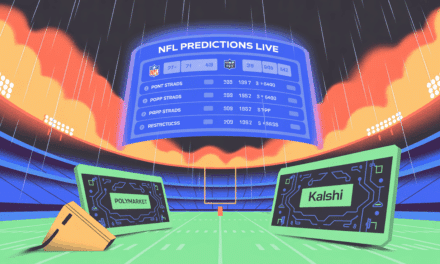In a move that could reshape Illinois’ booming sports betting industry, state lawmakers have introduced two bills aimed at tightening regulations on artificial intelligence and financial transactions. The proposed measures—SB2398 and SB2399—could significantly impact operators, players, and affiliates, sparking debate over responsible gaming, data privacy, and financial freedom.
With sports betting revenue hitting record highs across the U.S., Illinois is taking a more cautious approach, pushing for stronger consumer protections. But while proponents argue the reforms are necessary, critics warn they could stifle business and drive bettors to less-regulated markets.
Cracking Down on AI in Sports Betting (SB2398)
One of the more controversial proposals, SB2398, would ban sports betting operators from using artificial intelligence in three key areas:
- Tracking individual wagers to analyze betting patterns.
- Personalized promotions that target specific players.
- AI-generated gambling products, including microbets—small wagers on in-game events like the next touchdown or strikeout.
A Blow to Innovation or a Necessary Safeguard?
The bill’s backers argue that AI-driven personalization encourages excessive gambling by tailoring offers based on a player’s betting habits. Illinois Senator Bill Cunningham, who introduced the measure, says the goal is to prevent sportsbooks from exploiting vulnerable gamblers through hyper-targeted incentives.
But industry insiders warn that restricting AI could hurt user engagement and put Illinois sportsbooks at a disadvantage. Other states and international markets continue to leverage AI for tailored experiences, and limiting its use could make Illinois a less attractive market for major operators.
« AI has revolutionized sports betting by making the experience more interactive and user-friendly, » said a Chicago-based sportsbook executive who asked to remain anonymous. « Without it, we risk falling behind. »
Players and Affiliates Feel the Impact
For bettors, the ban could mean fewer personalized offers and a more generic gambling experience. While some may appreciate fewer promotional nudges, high-frequency bettors might find the market less rewarding.
Affiliates—who promote sportsbooks through targeted advertising—could also take a hit. Without personnalized marketing, affiliates may struggle to connect the right promotions with the right audience, potentially reducing conversion rates and ad revenue. On top of that, new deposit rules and paiment methods will bring more work to change their content accross their assets.
Credit Card Ban and Deposit Limits: Financial Protections or Overreach? (SB2399)
SB2399 takes aim at financial practices in sports betting, introducing several key restrictions:
- No more than five deposits per player within a 24-hour period.
- A ban on credit card deposits.
- Mandatory affordability checks for large deposits, verifying that players can afford to wager more than $1,000 per day or $10,000 per month.
The Case for Responsible Gambling
Lawmakers argue that these restrictions are necessary to curb problem gambling and protect bettors from spiraling into financial distress. Credit card bans have already been implemented in the UK and Australia, and affordability checks are seen as a way to prevent players from betting beyond their means.
« This is about protecting consumers from gambling addiction and financial ruin, » said a spokesperson from the Illinois Gaming Board. « We need to ensure that sports betting remains a form of entertainment, not a financial burden. »
Operators Face Compliance Headaches
For sportsbooks, the new rules could introduce significant compliance costs. Implementing affordability checks requires new verification systems and could slow down the deposit process, frustrating high-rollers and frequent bettors.
Some operators also warn that limiting deposits and banning credit cards could push players toward offshore, unregulated betting sites that lack consumer protections.
« Players who want to use credit cards or deposit more frequently will find other ways to bet, » said the sportsbook executive. « The concern is that we might drive them to riskier alternatives. »
Affiliates May Need to Rethink Strategies
Affiliates, who earn commissions for directing players to legal sportsbooks, could see a decline in sign-ups if deposit limits discourage casual players. Marketing strategies may need to shift toward responsible gambling messaging rather than high-value promotions.
Tackling Cannibalization Concerns in Illinois’ iGaming Bill
Illinois lawmakers are taking a firm stance against potential job losses in the casino industry as they push forward with their iGaming legislation. Under the proposed bill, online casino operators will face a 25% tax on adjusted gross revenues, with the ability to deduct free play and promotional credits.
The cost of an initial iGaming license will be set at $250,000, while renewals will require a $100,000 fee. However, the renewal process comes with a critical condition designed to protect the state’s retail casinos from workforce reductions.
A key provision in the bill prohibits the Illinois Gaming Control Board from issuing or renewing an iGaming license to any casino operator that has cut its workforce by 25% or more since February 28, 2020, or since receiving its iGaming license.
“The Board may not issue an Internet gaming license to an owner’s licensee or organization licensee that has reduced the size of its workforce by 25% or more since February 28, 2020. The Board may not renew the Internet gaming license of any owner’s licensee or organization licensee that has reduced the size of its workforce by 25% since the date its last Internet gaming license was issued or renewed,” the bill states.
This provision is a direct response to concerns raised by casino unions and iGaming skeptics, who argue that online gaming could lead to cost-cutting measures at brick-and-mortar casinos—particularly through staff reductions. By linking licensing approval to workforce retention, lawmakers are making it clear that the state will not allow online gaming expansion to come at the expense of casino jobs.
The debate over iGaming continues to heat up, but one thing is certain: Illinois is looking to balance industry growth with job protection, ensuring that digital expansion does not come at the cost of its casino workforce.
What’s Next?
The bills are still in the early stages, but if passed, Illinois would be among the most tightly regulated sports betting markets in the country.
For operators, compliance will be the biggest challenge, requiring them to rethink their engagement strategies and financial processes. Players will gain added protections, but at the cost of flexibility and convenience. Affiliates may need to pivot their their content to align with stricter advertising and deposit restrictions.
As the debate continues, one thing is clear: the Illinois sports betting landscape is on the brink of significant change. Whether these measures will strengthen consumer protections or simply drive players to less-regulated alternatives remains to be seen.





